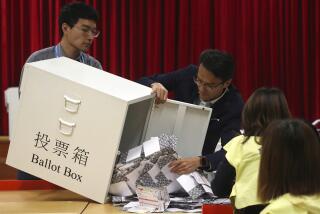Beijing and Hong Kong Squabble Over Legislature, Courts, Media
- Share via
The key issues for the reversion of Hong Kong to Chinese rule in 1997 include the system of governance, the courts and the press. How they shape up:
LEGISLATIVE COUNCIL
Hong Kong and Beijing are at odds over democracy. China does not explicitly reject it and has promised that all 60 members of the Legislative Council will be directly elected by 2007, up from 20 now. But as one China supporter has said, “Beijing . . . wants to know the results of the election before it happens.”
British Gov. Christopher Patten, though not increasing the number of directly elected seats, has exploited a legal loophole to expand the number of people allowed to participate in the democratic process.
“Hong Kong people shouldn’t have to settle for rigged elections,” he said, infuriating Chinese officials, who believe that he is changing the Joint Declaration that set forth the terms of reversion to Chinese rule.
Of the current council’s 60 seats, 30 are filled by elections in “functional constituencies,” essentially lobbies representing various professions. This process, in effect, will allow people to vote twice: once directly for a general candidate and once indirectly for someone to represent them in the workplace. Patten increased the range of professions to include almost all of Hong Kong’s 2.7 million workers.
Ten seats are to be selected by an electoral college. Previously, the college was appointed, ensuring at least 10 lawmakers friendly to the governor. Now it is made up of elected district board members.
China has rejected the new structure and vows to disband the sitting legislature in 1997 and replace it with a temporary, appointed legislative body
COURT OF FINAL APPEAL
To reach the equivalent of a U.S. Supreme Court ruling, a Hong Kong case must be brought before the wigged and robed judges of England’s Privy Council. That will change when Britain surrenders sovereignty to China in 1997, and so Hong Kong must set up its own court of final appeal.
But China and Britain cannot agree on the composition of the bench. Beijing wants to appoint the judges on the five-member bench and to limit the number of “foreign” judges to one. Opponents argue that more non-Chinese judges should be allowed, both to augment Hong Kong’s small pool of top judges and to guarantee the independence of the court.
“Our independent judiciary is the only branch of government which will hopefully not be under China’s control in 1997,” lawmaker Martin Lee wrote in a recent article.
“On what court in the world do you have foreign judges?” responded a legal adviser to Beijing. “China is already being quite generous to allow for foreign expertise from one judge.”
A reliable court system is a necessity if Hong Kong is to remain an international business center, legal experts say. But as the transition nears, more business people are ensuring that contract disputes can be arbitrated outside Hong Kong.
PRESS FREEDOM
The Basic Law promises protection of press freedom after 1997. The Chinese constitution guarantees it on the mainland. So why are Hong Kong journalists skittish?
Newspaper and TV reporters complain of calls from the New China News Agency, which speaks for Beijing in Hong Kong, criticizing stories that do not portray China in a positive light. Mainland Chinese companies are encouraged to advertise exclusively in publications approved by Beijing. Media companies with hopes for sales in China’s giant market must toe the government line.
The pressure extends to international media as well. Rupert Murdoch dropped BBC News from his Star TV satellite network and sold most of his stake in Hong Kong’s South China Morning Post in exchange for permission to broadcast Star TV in China. “We certainly don’t want Star to be shut down because of the opinions of some of our editors,” he said.
More to Read
Sign up for Essential California
The most important California stories and recommendations in your inbox every morning.
You may occasionally receive promotional content from the Los Angeles Times.










